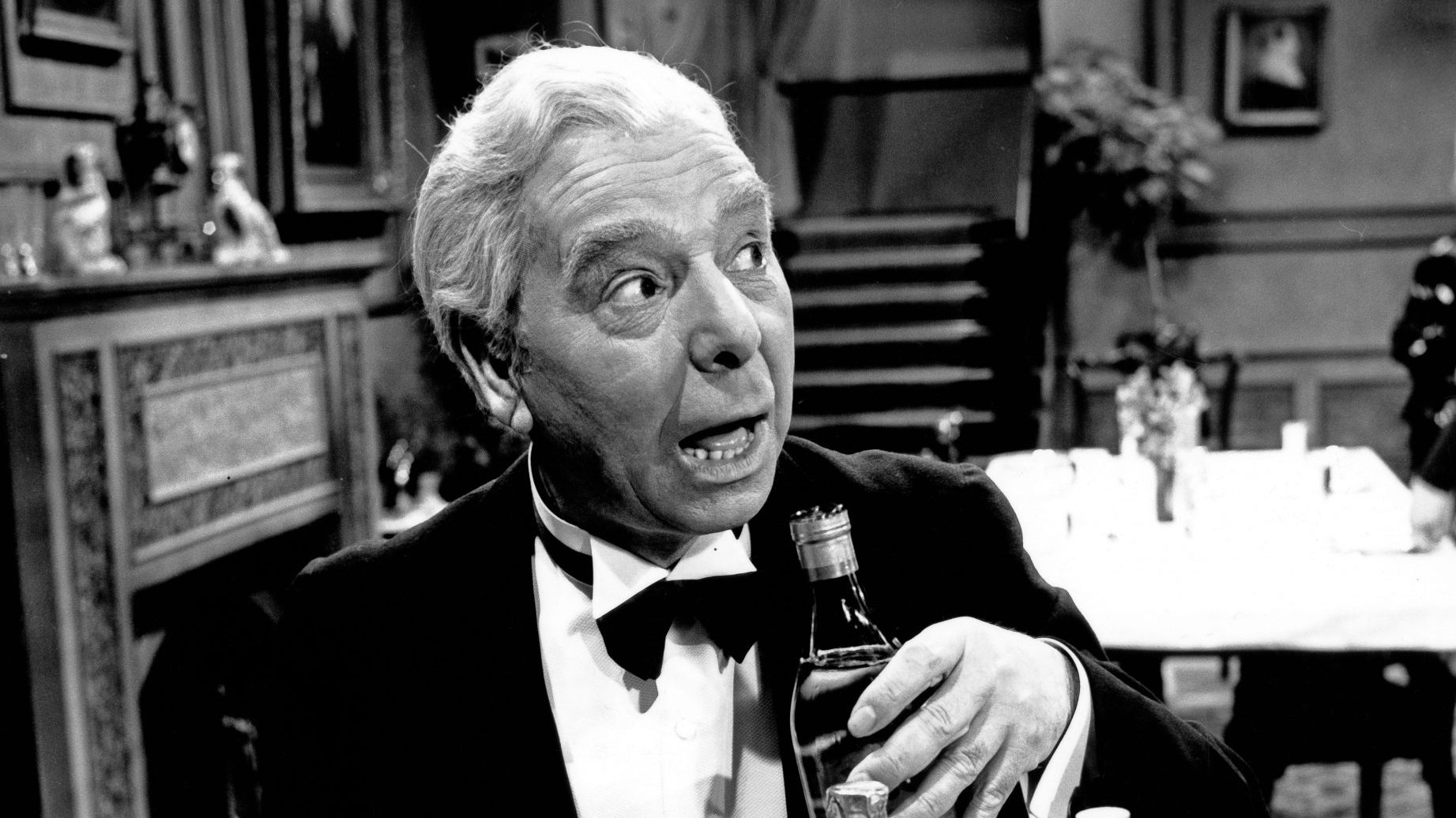This New Year’s Eve, like every New Year’s Eve, millions of Germans will mark the day in the same way: by watching a decades-old, English language TV comedy sketch largely unknown in its home country. Many will watch it more than once.
As much as Dinner for One is known in Britain, it is for being unknown. The 20 minute-long slapstick-strewn sketch was only shown on UK TV for the first time in 2017, and even then on now-defunct Grimsby-based local station Estuary TV.
And yet for much of Germany it remains appointment viewing. In 1995 it became the country’s most frequently repeated television programme ever. So often is it shown across so many channels on December 31 that last year you could have watched it 14 times without requiring a recorder (that’s 14 times as the original version, in English with a German introduction. It was also screened dubbed in three of Germany’s regional dialects).
“Even if the younger people do not really like the humour, and they think
it’s slow and it’s old-fashioned, the parents and the grandparents say ‘you have to watch this, it’s tradition. We have to watch this every year’,” says the satirist Oliver Kalkofe when he speaks to me from his Berlin home via Zoom. But why?
For the uninitiated, Dinner for One is a two-parter set at the 90th birthday party of Miss Sophie – albeit a party where she is the only guest. “Is everybody here?,” she asks her butler, James, played by Grimsby native Freddie Frinton. “They’re all here waiting, Miss Sophie, yes,” he responds, pointing to the empty seats assigned to each of Miss Sophie’s presumably long-dead friends, “Sir Toby”, “Admiral von Schneider”, “Mr Pommeroy” and “my very dear friend, Mr Winterbottom”.
The evening unfolds with James serving Miss Sophie four courses, each with a different drink – sherry, white wine, champagne and port – and, in the absence of her friends, having to move around the table, toasting the hostess in character, from Sir Toby’s “Cheerio!” to Mr Winterbottom’s bluff Yorkshire “Well here we are again, me old luvvie”.
As the sketch progresses, James inevitably becomes increasingly drunk, tripping over the head of the home’s tiger head rug, crashing into furniture and, at one point, downing the water from a flower glass (Frinton plays drunk well – no mean feat – and interestingly, like Richard E Grant, who gave one of the defining drunk performances in Withnail and I, wasn’t a drinker in real life).
But it’s the catchphrase which is most associated with Dinner for One and which most Germans can recite word for word. Before each change of drink, James asks “the same procedure as last year, Miss Sophie?,” to which she replies “The same procedure as every year, James”. And so it continues until the very end, when Miss Sophie retires to bed. As a now decidedly sloshed James offers his arm, he asks the same question again, getting the same answer, and responds “Well, I’ll do my very best,” before winking at the audience.
Dinner for One was originally performed in English music halls in the 1920s by the duo Binny Hale and Bobby Howes, having been written by Lauri Wylie. Frinton, a music-hall actor who had left school at 14 to work in a fish-processing factory (but was apparently sacked for distracting co-workers with his comic act), is said to have first seen it in 1954. Later that year he would perform it himself for the first time. It was a hit. The sketch, as performed by Frinton and a number of actresses, was in demand at theatres all over the country. But it wasn’t making Frinton a superstar, not yet, and not in his own country.
In August 1962, two men working for northern Germany’s regional TV station, NDR, were in Blackpool looking for a new act. Peter Frankenfeld was a comedian, Heinz Dunkhause a producer. The choice of town wasn’t as random as it may sound today – by the early 1960s, although the advent of ITV had attracted many variety acts down to London in search of fame and fortune, the Lancashire resort still had a reputation for music-hall entertainment. And in the early 1960s, Germany was looking to Britain for comedy.
“We were at that time – the 60s, the 70s, even the 80s – Germany was a developing country for humour and comedy,” Kalkofe, the host of German TV’s long-running Kalkofes Mattscheibe, tells me.
“We didn’t have much. After the war we had a long time where we were not confident enough to be happy. Other countries, after the war, tried to deal with it with humour, there were already sitcoms about the second world war. In Germany you couldn’t do that. It was difficult. We didn’t have a culture of stand-up comedy or something like that.
“And so we were always looking to England. England was great at humour. We were talking about ‘oh, the British humour. The British people, they’re not afraid of making jokes about serious subjects’. So we were always looking to English and American humour and, if we found something we could show here we were very happy. But it wasn’t very often because people didn’t speak a lot of English at that time.
“We were very, very enthusiastic about England because we loved the English style, the English tradition, the English humour. Being special, being a little bit different [compared with] the total stiffness of Germany. The British also had that, but they also had self-irony. But we didn’t. We were not very funny people in Germany. And so that was something exotic.”
On that night in 1962, Frankenfeld and Dunkhause found themselves at
Blackpool’s Winter Gardens. The sketch they saw was Dinner for One, starring
then 52-year-old Frinton and 72-year-old May Warden, by then his well-established Miss Sophie. And the two Germans were immediately knocking
on their dressing-room door to heap praise upon their pair and invite them
to Hamburg to perform it on prime-time TV.
“The sketch was exotic, it was British, it was funny, everyone could understand it – it’s mostly silent,” says Kalkofe (also the voice of Matt Lucas on German TV’s dubbed Little Britain). “It’s physical humour – a man getting
drunk. Which was not very German at that time, watching someone getting
drunk, because we always tried to be very serious.”
A number of articles about the sketch and Frinton have referred to Frinton’s alleged antipathy to Germany and Germans as a result of his experiences in the second world war. I have found no evidence of this (nor even that he saw any frontline action), and when I speak to the TV journalist Christian Breidert, who 10 years ago made a documentary marking the 50th anniversary of Dinner for One’s German TV debut, he says: “I interviewed his
wife, Nora, and his four children. I was asking her and she didn’t agree, she didn’t think there was an anti-German feeling with Freddie. I couldn’t find that. I couldn’t find that confirmed.”
What we do know is that Frinton bit the German pair’s hands off. He had always wanted to perform the sketch on TV, and in March the following year
he and Warden were flying to Hamburg to perform the sketch live on Frankenfeld’s show Guten Abend. Four months later they returned to the port
city to do a proper recording – the one still shown on TV to this day – at the
Theater am Besenbinderhof (the theatre still mentions this moment in history on its website’s homepage). According to NDR, the pair received DM4,150 each, around £3,100.
For the next nine years, it became a sort-of staple, shown on the many regional stations which made up, and still make up, Germany’s television
landscape. Until 1972, when NDR showed Dinner for One at 6pm on Silvester (New Year’s Eve in German). And something stirred in the German psyche.
“A programme director in 1972 decided to show it on the evening of New Year, the 31st, and this was the game-changer,” says Breidert, also speaking to me from Berlin.
“Because people immediately associated the being drunk and celebrating with guests and ‘Happy New Year, Miss Sophie’ and ‘Same procedure as every year’. They associated that with the New Year’s festivities, and that’s when it became a tremendous success and now it’s part, for many people, of the New Year’s tradition.
“They just watch it with their family and they know every word by heart and they know how often James will stumble over the tiger skin and so on. After 1972 it was even not allowed to show it within the year, it was really considered to be the Silvester event.”
Oliver Kalkofe agrees. “In the 70s, 80s and so on, it was important to watch
something with your family,” he says. “You didn’t have the internet or any
other stuff, [so] everyone gathered around the TV and watched something
which everybody could laugh at.
“The kids could laugh at the man stumbling over the tiger head. The grown-ups could laugh at the very little things such as ‘the same procedure as every year’ when they’re going up the stairs at the end. It was so nice, it wasn’t offensive to anyone, so that was good for us. It was friendly, it was nice and it was British.”
Frinton did not live to see his unlikely German fame. In 1968, as Breidert says: “He was on his way to [becoming a] superstar, being part of a TV series, Meet the Wife, and then a heart attack hit him and he died”.
He was just 59. Meet the Wife, a BBC sitcom starring Frinton as the put-upon husband to Thora Hird’s overbearing wife, had run for five series and may well have been on the way to making him a national star (it is name-checked in the Beatles’ Good Morning, Good Morning).
And yet he, and the sketch he loved, remains an institution in Germany. And elsewhere too – it is still shown in the other German-speaking countries, along with Scandinavia. But it is in Germany where it is the biggest mainstay, with some fans playing a drinking game along with James’ epic bibulation and a particular hardcore even matching Miss Sophie’s four-course meal of mulligatawny soup, haddock, chicken and fruit.
Breidert briefly pauses when I ask whether he still actually finds it funny. “You hear the loud laughter of one person, and I met this person, she’s from Hamburg, she used to operate in the telephone department for NDR and was asked to participate because Freddie Frinton wanted to have an audience in order to have the real atmosphere that he was used to from his variety [shows],” he says.
“So I see the sketch again and I hear the laughter and that makes me laugh, you know? Because I know these people who are all connected to the whole sketch. So I can’t tell you if I laugh about what’s represented on the stage or about everything I know about the sketch.”
Perhaps it’s these individual moments, those personal connections, that still
give Dinner for One a place in so many Germans’ hearts every December. But
interestingly, while the British may wonder about the oddness of this most
unlikely of exports, it seems many Germans don’t know it remains largely
obscure in its home country.
“I went twice or three times to London, interviewing people in pubs, asking if they’d ever heard of Dinner for One, showing them the piece on the iPad,” says Breidert of making his documentary. They hadn’t.
“I think most people think that it’s very popular in England, that it must be,” says Kalkofe. “If you asked most people, they would think it must be a tradition in England and we copied it. Most people are surprised when they
hear ‘no, no, they do not know that, that’s only here in Germany’. It’s bizarre. It’s really bizarre.”
It is. And yet in millions of German households this New Year’s Eve it will be, as ever, the same procedure as every year.




